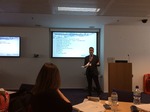Erasmus+ study visit to Bergen: public libraries and their roles and work in inclusion and learning
 Friday, August 2, 2019 at 10:31AM
Friday, August 2, 2019 at 10:31AM In May this year, I was really pleased to join an Erasmus+ study visit to Bergen, Norway. It was organised by the Norwegian government agency, Diku, with the aim of exploring “the roles and work of public libraries relating to inclusion and learning”. It drew together participants from 16 European countries, and I was one of two from Scotland representing the UK.
As an information literacy librarian from a Scottish further education college (not a public library), being able to take part in this was something of a surprise. I’m a big fan of all things Nordic, so you can imagine my delight at going! My interest in the visit stemmed from work I’ve been doing in my college for the last couple of years. I have been mentoring ESOL and supported learning students taking part in library-based work experience. Through this student contact I’ve been both learning and thinking a lot about inclusivity in its various forms, which is why this study visit really caught my attention.
In Norway, the 2014 Libraries Act directed libraries to become arenas for conversation and debate. It is a country well known for its generous social funding, and through the Libraries Act, money was made available to help with upgrading technology, adapting and furnishing meeting spaces in libraries and upskilling staff.
The conversation element of what the Libraries Act stipulated (largely interpreted as community conversations within libraries) was evident in both the Bergen and Voss libraries we visited, and in the presentations from other Norwegian municipal libraries. For example, the libraries in Voss and Bergen both have training and meeting rooms open to public booking, spaces for lectures, talks and music events, and other smaller areas which can be adapted for different uses (such as storytelling, literature and poetry readings).
Most of the Norwegian participants admitted that the debate element of the Act posed more difficulty and risk. Are there some voices and views that shouldn’t be given a forum, especially in the field of politics (recalling the 2011 Oslo and Utøya attacks)? What role do librarians have in deciding whether a controversial debate should take place, or in policing what is discussed when they are hosting or facilitating a debate? This area is still a work in progress.
I was very struck by the role that help in person played. Libraries aren’t simply hubs for books or tech, but places where people come together, talk, learn, and make connections and friendships.
Norway has welcomed a large number of new citizens and takes their integration into Norwegian society seriously. The Red Cross is very present in libraries when delivering language support, and many libraries offer activities focussed on bringing different groups together for reciprocal learning. There are many examples of language clubs where native and new citizens meet and exchange cultural information on cooking, crafts, folk songs etc.
Tackling the risk of isolation was another theme, with some libraries liaising with high school students to provide tech and digital help aimed at older adults who may lack family support, or feel adrift when technology has moved on too fast.
In between library visits and presentations, we discussed in small groups the range of practical help and workshops that public libraries in our home nations offer library users: assisting access to government information (sometimes also completing forms and applications); teaching digital skills; homework clubs (open to all, but used most often by refugee families); and training adults with low literacy and numeracy skills levels, to help them in to employment. There were a few explicit mentions of information literacy, and as you can tell from the above, information literacy was an undercurrent in discussions and our library visits.
I learned a lot from this short visit, and as I summed it up in my post:
“The message from Norwegian librarians – and others - is clear. To bring people into libraries, be flexible, facilitate and adapt. Provide an adaptable physical space if you want people to connect and talk and reduce isolation. Skilling librarians for this new environment means providing support and training in being a presenter, organiser, communicator and a good listener – and learning about the technologies to enhance these roles.”
You can take a look at the blog post I wrote for EPALE here. (“EPALE is a European, multilingual, open membership community of adult learning professionals, including adult educators and trainers, guidance and support staff, researchers and academics, and policymakers”).
Claire Roberts, Information Literacy Librarian, City of Glasgow College
 adult learning,
adult learning,  inclusion,
inclusion,  public libraries in
public libraries in  Public Libraries
Public Libraries 
